Valley Metro – Promoting Alternative Modes of Commuting to Improve Air Quality
Faced with an intractable air quality problem in metropolitan Phoenix, the region’s transit agency, Valley Metro, took on the role of operating a successful program to dramatically reduce the rate of driving alone to work. Their work was bolstered by a state statute requiring employers to make a good-faith effort to reduce solo driving trips by participating in a regional trip reduction program.
 Flickr photo by Devin: https://www.flickr.com/photos/kingdafy/321019324/
Flickr photo by Devin: https://www.flickr.com/photos/kingdafy/321019324/
Phoenix and surrounding Maricopa County were first classified as a “non-attainment area” for air quality in 1978 under the federal Clean Air Act, with a requirement that the state of Arizona oversee clean-up efforts.
Ten years later, with the state still out of compliance with pollution standards, the legislature in 1988 passed an Omnibus Clean Air Act calling for mandatory vehicle emissions testing. That law also required the region to develop a trip reduction program (TRP) charged with reducing drive-alone trips in order to improve air quality and reduce congestion. Maricopa County adopted and began administering its trip reduction program that same year. With the region still out of compliance with pollution standards in 1993, the legislature further strengthened the requirements so that all employers and schools with 50 or more employees would have to participate in the program.
The trip reduction program in Phoenix
The trip reduction requirement gives employers and schools the goal of reducing drive-alone trips and/or miles traveled to the work site by a minimum of 5 percent each year until they reach the target of having only 60 percent of their workforce driving alone. In 2014 the overall rate of solo commuting in Maricopa County was 73 percent, according to Maricopa County Air Quality Department.
The Maricopa County Air Quality Department coordinates and administers the Trip Reduction Program, while Valley Metro, the regional transit agency, serves as implementing partner, working with employers to provide free training and technical assistance in meeting the trip reduction requirements. Funding comes through the Maricopa Association of Governments (the metropolitan planning organization in charge of transportation planning for the Phoenix region), the Arizona Dept. of Environmental Quality and the Arizona Dept. of Transportation.
In fiscal 2014, 1,119 employer and school-based trip reduction plans were approved and surveys were administered to over 769,000 employees and students to help them meet their commuting needs.
How Valley Metro helps reduce trips in Phoenix

When Valley residents and employees carpool, take the bus or light rail, walk, bike, telework or work compressed work week schedules, they contribute to a vital objective: cleaner air.
Valley Metro plays a key role in reducing trips by helping provide individuals with an alternative commute mode or schedule, so that more and more workers carpool, take the bus or light rail, walk, bike, telework or work compressed work week schedules. The agency also assists by administering a vanpool program. Valley Metro also helps train participating companies on the ins and outs of the TRP by leading introductory workshops and giving on-site presentations by a “Commute Solutions” representative. These training opportunities offer employees a sense of the options that exist to help them get to work or simply to help reduce their transportation expenditures. Program officials also organize meetings of the transportation coordinators designated at each work site, who serve as the point person for providing information on alternative commuting methods to other employees.
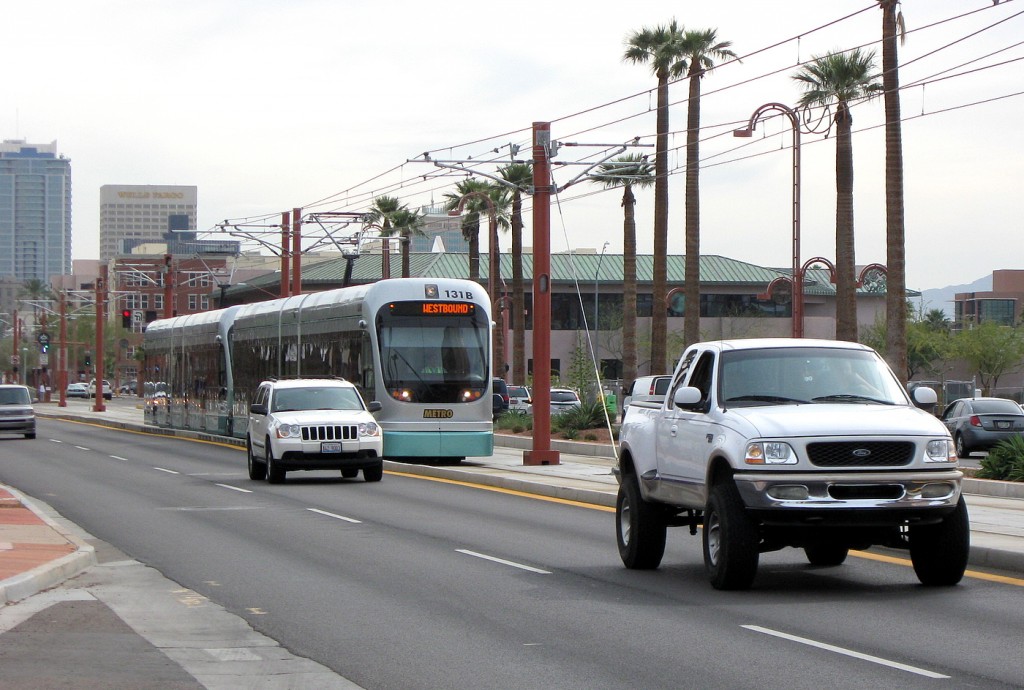
Flickr photo by Sean_Marshall https://www.flickr.com/photos/7119320@N05/3312521445/
Companies have shown a substantial interest in providing their workers with a variety of alternative commuting options. Many suburban employers have added vanpooling programs, with Valley Metro facilitating more than 400 of these vanpools.
A private contractor, V-Ride, administers the vanpool program and insures the vanpool vehicles, and Valley Metro uses federal aid to purchase the vans. Maintenance is coordinated with each driver and the commuters in each vanpool share the operating costs – fuel, insurance, maintenance, and program administration. One landscaping company in the Phoenix suburbs, for instance, had difficulty getting their mostly low-income workers to work. Through the assistance of Valley Metro, they now have an organized vanpool service to get those employees to the work site.
In the more urban areas of the region, there can be a larger emphasis on taking public transit or walking and biking to work. In many instances, workers are often unaware of these other transportation options until program representatives give worksite presentations showing commuters how changing their commuting mode can be both cost-effective and time-efficient.
Biking, for instance, has really taken off in Maricopa County as an option for commuting. Six percent of commuters in 2014 traveled by bike at least one day per workweek — comparable to bus and walking rates in Maricopa County, according to the county transportation demand management data.
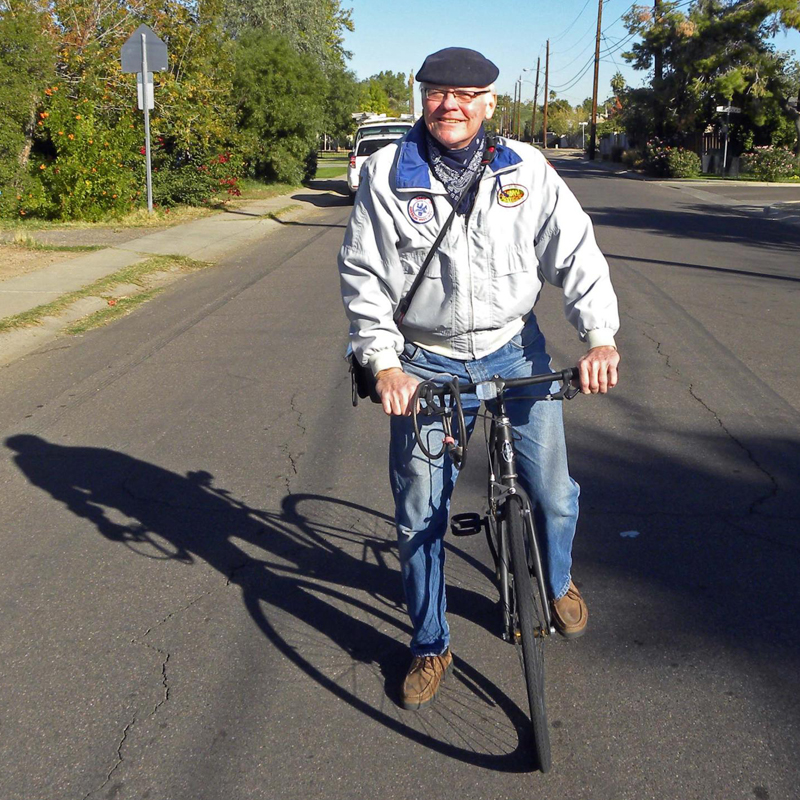
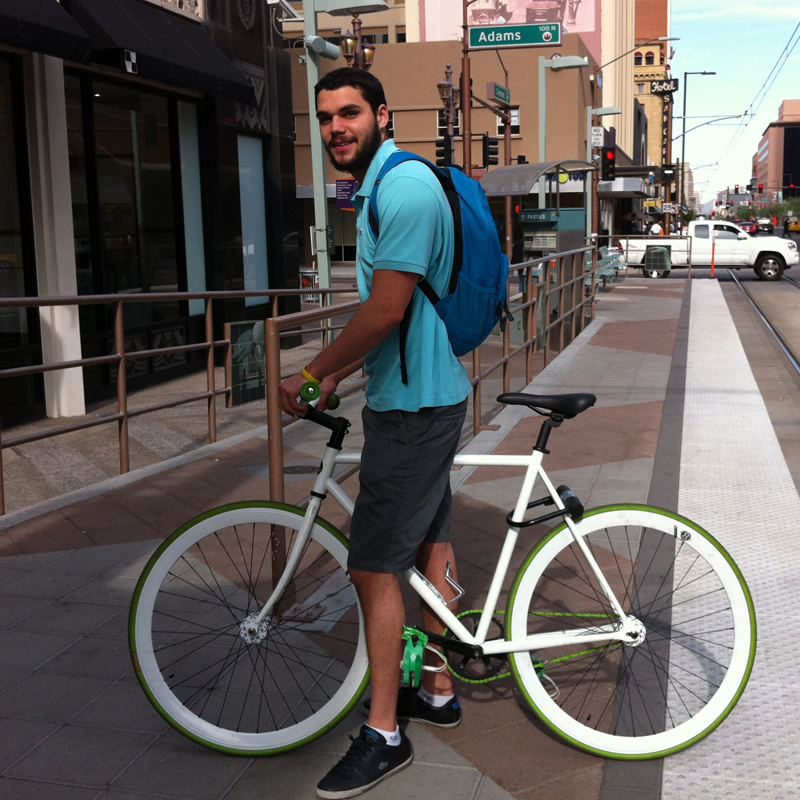
Left photo by Jeremy Stapleton. https://www.flickr.com/photos/jeremystapleton/6437798845/
Right photo by Lindsay Kinkade. https://www.flickr.com/photos/lindsaykinkade/6426697183/

Mode of travel used at least one day per week, 2014. (Multiple options allowed.)
Partnering with employers, and also appealing directly to commuters
While Valley Metro has long worked directly with employers, they’ve also found significant success in reaching out directly to commuters, making an end-around the companies that are less active in their participation. Valley Metro’s direct efforts appear to be succeeding: Surveys show more than 59 percent of residents recall seeing or hearing about Valley Metro services, with 74 percent saying they view the advertising favorably.
As an incentive to participate in the trip reduction program, Valley Metro offers monthly contests for employees and employers that participate in the TRP through ShareTheRide.com. Some of the rewards include gift cards and free trips to area museums. The site promotes Rideshare Month and Valley Bike Month, and provides detailed information and education to help residents with their commute solutions.
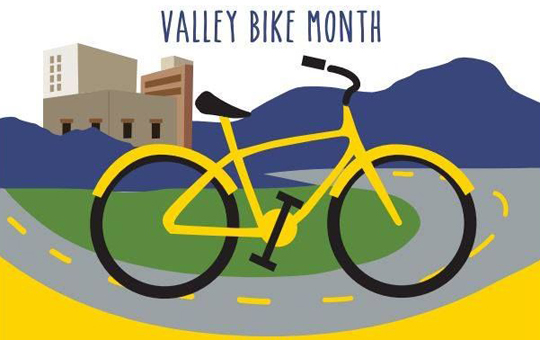
The last year has seen substantial growth in the number of people using ShareTheRide.com to coordinate their commutes: Users increased by 36.4 percent to 29,000 active users. There were nearly 11,100 ride requests this past year with 8,200 finding a shared ride, which resulted in 12 million fewer commute miles and $1.3 million in gas cost savings. During Valley Bike Month this year there were nearly 65,000 alternative mode trips logged on ShareTheRide.com, and with the emergence of the Bike Month Challenge, the contest entries tripled from the previous year to nearly 2,700 entrants. Overall, there were in excess of 14,000 people participating in 20 Valley Metro events related to alternative commutes.
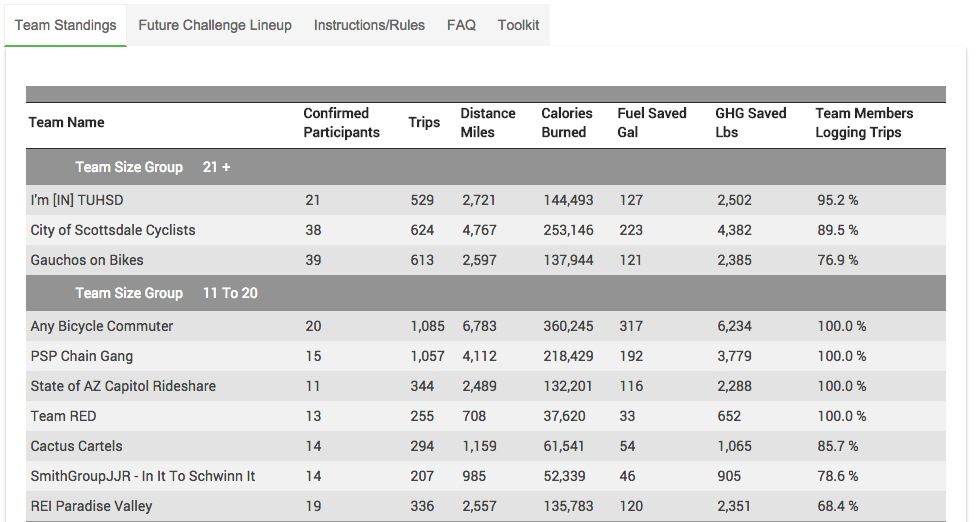 https://www.sharetheride.com/Public/ChallengeManager2.aspx
https://www.sharetheride.com/Public/ChallengeManager2.aspx
Valley Metro continues to reduce the rates of single-occupancy vehicle commuting through active engagement with employers in the region, and through reaching commuters directly with their online platform sharetheride.com and events like Valley Bike Month. Through the work of Valley Metro to make other commuting modes more visible, convenient, and better utilized, drive alone travel has declined substantially — helping to improve regional air quality. The share of miles traveled by driving alone was at 83.6 percent in 1991, and in the latest data for 2014, it stands remarkably lower at 73.1 percent.
For general information on the Trip Reduction Program visit: http://www.valleymetro.org/business_services_new/trip_reduction_program. For specific inquiries on Valley Metro’s efforts to meet commuter needs contact Dawn Coomer, TDM Manager at Valley Metro Commute Solutions: DCoomer@valleymetro.org, (602) 253-6053





